Posted by Euan Bennet on 14/03/2017
When I heard that the First Minister, Nicola Sturgeon, would be making a speech yesterday morning I assumed (like many others, apparently) that it would be along the lines of “one last chance for compromise, etc etc” before the UK Government triggered Article 50 to begin the process of leaving the EU. I suspected that I was very wrong within the first few moments of the press conference, and it was confirmed a few minutes later as the FM announced her intention to seek first the Scottish Parliament’s, and then the UK Parliament’s approval for a Section 30 order. This would transfer the power to the Scottish Parliament to be able to hold a legally-binding independence referendum between Autumn 2018 and Spring 2019. The timing is key, as it must be once the terms of the Hard Brexit were are being dragged towards are known, but not too late to avoid the damage that Hard Brexit will cause.
The full text of the First Minister’s speech can be read here, and the speech itself plus questions from the media can be viewed here.
I wrote last year that people in Scotland now had to choose which Union they wanted to be a part of – either the UK or the EU. If you need a snappy sound-bite explaining how the two Unions are different, riddle me this: why is it that the Scottish Government must ask permission from the UK to hold a vote on independence, but the UK Government did not have to ask permission from the EU to hold a vote on leaving the EU?
Nicola Sturgeon demonstrated two things yesterday: 1) some actual political leadership in outlining a plan for dealing with the turmoil ahead once Article 50 is triggered, and 2) that she has meant every word that she has said on the subject since the 24th of June last year. The metroparochial media bubble had convinced themselves, and by extension Westminster, that the FM was “only bluffing”, that “she doesn’t want another referendum because she’d lose again”, and that “she doesn’t actually want independence, just another grievance to pursue”. They failed to consider that the FM was serious about delivering her party’s manifesto commitment, and protecting the interests of the people of Scotland.
The referendum campaign starts now
Yesterday saw some frantic scrambling around by the UK Government who by all accounts were caught completely flat-footed. It also saw some frantic scrambling around by the media who managed to trot out a bunch of reheated scare stories about independence would be the worst thing ever and anyway, “Sturgeon shouldn’t be allowed”. Perhaps it’s some residual immunity from the apocalyptic fear bomb that was dropped on us in the final week of the 2014 indyref campaign, but I’m finding the desperation quite funny. Metaphorically, the smell of fear is overwhelming. Anyone with any grasp of how numbers work can see how different the situation is now compared to pre-2014. When the 2014 referendum was announced support for independence was trending at around 28-30% in opinion polls. After recording an actual vote of 44.7% in favour of independence at the end of a campaign of scaremongering and negativity, recent opinion polls have shown independence support at around 48-49%. One much-touted poll last week was split exactly 50/50 among those “certain” or “likely” to vote. Now that a vote is back on the agenda the starting point of support requires a far smaller shift in percentage terms than would have been needed last time round.
That said, the fact that the fear and negativity has already begun means that it’s going to be a very long 18-24 months. Supporters of the UK Union have literally nothing else to support their arguments. All of the key arguments of the 2014 referendum are now dust in the wind, thanks to the subsequent actions of the UK Government. The hardest thing for supporters of the UK Union to grasp right now is that it is the UK Government’s actions which have brought us to this point. In 2014 the UK Government pitched in with lots of support for the No campaign from the civil service, especially the Treasury.
This time around they will be dealing with multiple crises: not only the Brexit negotiations and a campaign against Scottish independence, but potentially also a growing constitutional crisis in Northern Ireland. Added to that the possibility of a movement in England and Wales agitating to call off the Brexit process, the extent of the omnishambles created by Westminster is such that even a vile separatist such as myself is moved to feel pity for the civil servants who will have to do the actual work of managing it.
The Wild Card – what will the EU do?
I was entertained yesterday by the people depicting the possible scenarios during Brexit negotiations.
Theresa May: We want a trade deal, and in exchange we’ll guarantee access to our waters for other member states’ fishing fleets.
EU27: Sorry Mrs May, 90% of your waters are in Scotland, and given the coming independence vote those are not your gift to give. What else?
TM: Erm, well there’s our renewable energy resources – let’s make a deal with those!
EU27: Scotland is the only part of the UK that exports energy, Mrs May please stop trying to negotiate with things that aren’t yours.
TM: Can I interest you all in some Innovative Jam?
It’s a flippant example, but it does show an idea of the opportunity that the other 27 member states will surely see. We’ve already seen MEPs from other member states make comments in a personal capacity along the lines of “if the UK wants to play hardball, so can we”. It’s been well-reported how lacking the UK Civil Service is in trained negotiators for the diplomatic challenges ahead.
It’s probably unlikely that the EU will come right out and guarantee Scotland’s status as a member state should we vote for independence, but anything can happen once negotiations begin. I would certainly expect the Scottish Government to continue their work in communicating with other member states and EU institutions to raise Scotland’s profile. The EU knows fine well that when the UK Government enters negotiations, they will not speak for all of the UK.
The key principle
In the run-up to the 2014 referendum I wrote about my key motivations for supporting a Yes vote. I was very pleased to see the First Minister touch on very similar themes in her speech yesterday. This part really spoke to me:
What Scotland deserves, in the light of the material change of circumstances brought about by the Brexit vote, is the chance to decide our future in a fair, free and democratic way – and at a time when we are equipped with the facts we need. It is – above all – about informed choice.We know that Brexit has made change inevitable. The option of ‘no change’ is no longer available. However, we can still decide the nature of change. Having Scotland’s referendum – at a time when the terms of Brexit are known – will give the Scottish people a choice about the kind of change we want. And it must be a choice for all of us.I know there are some who want me to rule out a referendum completely or delay the decision until much further down the line. I understand why some take that view. And of course these views weigh heavily on me. But so does this. And this, for me, is a key consideration.If I ruled out a referendum, I would be deciding – completely unilaterally – that Scotland will follow the UK to a hard Brexit come-what-may, no matter how damaging to our economy and our society it turns out to be. That should not be the decision of just one politician – not even the First Minister.By taking the steps I have set out today, I am ensuring that Scotland’s future will be decided not just by me, the Scottish Government or the SNP. It will be decided by the people of Scotland. It will be Scotland’s choice. And I trust the people to make that choice.

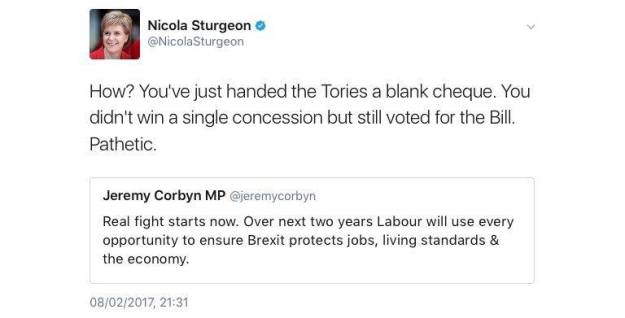
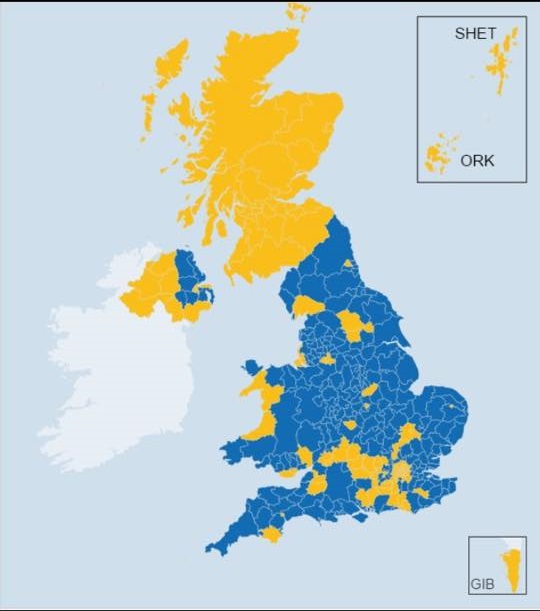
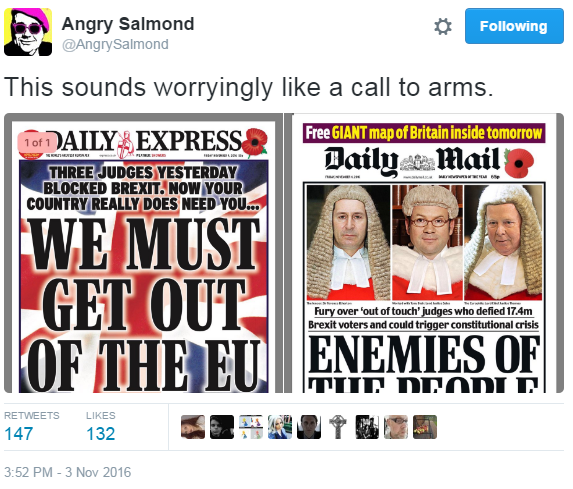
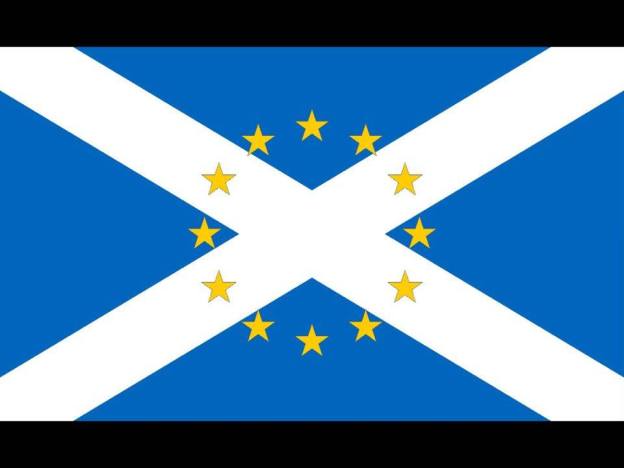
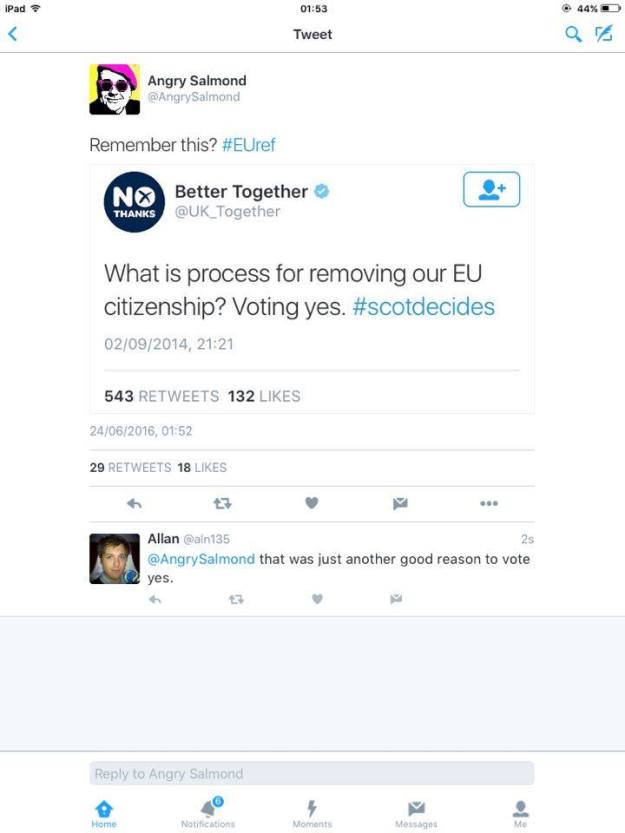
 Daily Mail says: Fantastic! Everyone is an average of £1,204 per year worse off!!! (Sincere apologies for the source)
Daily Mail says: Fantastic! Everyone is an average of £1,204 per year worse off!!! (Sincere apologies for the source)
